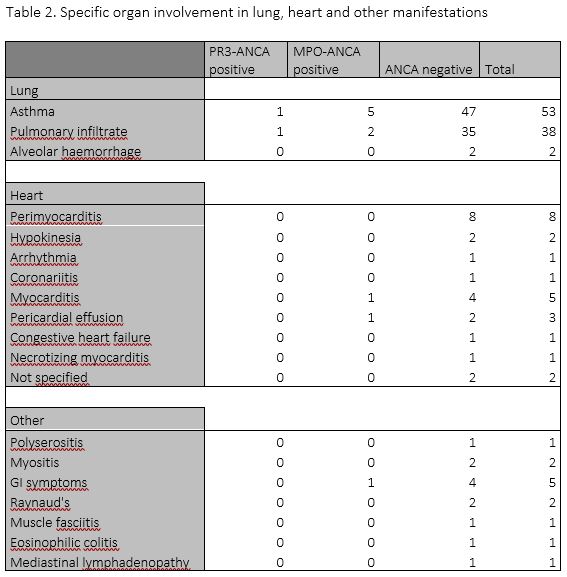Session Information
Session Type: ACR Poster Session B
Session Time: 9:00AM-11:00AM
Background/Purpose: To compare clinical features at diagnosis, relapse rates, therapy as well as long-term outcome of a cohort of patients with Eosinophilic Granulomatosis with Polyangiitis (EGPA) based on their ANCA status.
Methods: This study was conducted as a retrospective analysis of EGPA patients who were treated between 2008 and 2017 in a tertiary referral center. Diagnosis for EGPA was based both on American College of Rheumatology criteria and Chapel Hill definitions. Patient characteristics, clinical manifestations, organ involvement, therapy regime, relapse rates and follow-up outcomes were evaluated and compared in sub groups based on ANCA status.
Results: Six ANCA-positive (5 with MPO-ANCA, one with PR3-ANCA) and 49 ANCA-negative patients were included overall. Patients were followed up for a median±SD of 33.2 (± 32.7 SD) months. The most common clinical features (table 1 and 2) were asthma (94.5%), ear, nose and throat (ENT) manifestations (74.5%), pulmonary infiltrates (69.1%), peripheral neuropathy (47.3%) und skin lesions (38.1%).
ANCA-positive patients had a higher incidence of peripheral neuropathy (83.3% vs. 42.8%) and glomerulonephritis (33.3% vs. 0%). ANCA-negative patients had more frequent cardiac involvement (44.8% vs. 33.3%). Relapse rates were significantly higher in ANCA-positive patients (83.3% vs., 36.7%). Severe relapses also occurred more often in ANCA-positive patients (33.3% vs. 8.1%). Initial eosinophil count did not predict severity both at diagnosis or relapse. Interestingly, three patients suffered from a major relapse with peripheral neuropathy while presenting normal eosinophil counts. All ANCA-positive patient had severe disease and required induction therapy with cyclophosphamide or rituximab either at diagnosis or at the time of a severe relapse. Among the ANCA-negative patients, 67.3 % had no severe manifestations and were successfully treated with a combination of glucocorticoids and conventional immunosuppressants like methotrexate and azathioprine.
Conclusion: Our observations support recent reports showing that the ANCA status of EPGA patient is both relevant for clinical manifestations as well as relapse rates and relapse severity. ANCA-positive patients often require a more aggressive immunosuppressive therapy than ANCA-negative patients.
To cite this abstract in AMA style:
Mahrhold J, Hellmich B, Csernok E. Eosinophilic Granulomatosis with Polyangiitis: A Monocentric Cohort Analysis of Manifestations and Relapses of ANCA-Positive and ANCA-Negative Patients [abstract]. Arthritis Rheumatol. 2018; 70 (suppl 9). https://acrabstracts.org/abstract/eosinophilic-granulomatosis-with-polyangiitis-a-monocentric-cohort-analysis-of-manifestations-and-relapses-of-anca-positive-and-anca-negative-patients/. Accessed .« Back to 2018 ACR/ARHP Annual Meeting
ACR Meeting Abstracts - https://acrabstracts.org/abstract/eosinophilic-granulomatosis-with-polyangiitis-a-monocentric-cohort-analysis-of-manifestations-and-relapses-of-anca-positive-and-anca-negative-patients/


